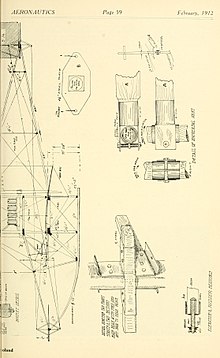| 1911 Conventional Biplane | |
|---|---|

| |
| Boland Conventional Biplane | |
| Role | Pioneer era aircraftType of aircraft |
| National origin | United States |
| Manufacturer | Boland Airplane and Motor Company |
| Designer | Frank Boland |
| First flight | 1911 |
| Number built | 1 |
| Developed from | Boland 1911 Tailless Biplane |
The Boland 1911 Conventional Biplane was an American pioneering aircraft.
During the winter of 1911-1912, Frank Boland built a conventional pusher biplane. Boland built this aircraft to compare it with the tailless aircraft that he'd been building for the 3 previous years.
Design and development
Frank Boland wanted to make sure that he fully understood the dynamics of a conventional biplane so, in the winter of 1911-12, he constructed an aircraft of his own design in Mineola, Long Island. This conventional pusher biplane had an interconnected forward and rear elevator. A movable rudder is mounted in the rear. Roll control was achieved using wing warping. Boland used this aircraft to contrast with the performance of his unorthodox tailless 'jibbed' biplane that he had completed the previous October.
Boland flew this plane throughout the winter in the snowy fields of Mineola. The aircraft was designed for an axle and a pair of wheels, but they were never mounted. In the icy conditions, taking off and landing using just the skids was fine.
This was the only conventional biplane constructed by Boland. After flying this aircraft through the winter, he disassembled the aircraft in the spring and returned to the development of his tailless aircraft.
Wing Warping

From Aeronautics magazine Feb 1912 issue describing the operation of the wing warping system illustrated to the right:
"The wings can be warped down by swinging the steering lever. As one side is warped down, the other side is free to bend up under the air pressure. The warping wires are normally taut and keep these ribs bent down to their regular curve. The curve is 21/3 inches deep, at 16 inches back. The front and rear beams are exactly the same height from the ground, the ribs going under the rear beam."
Specifications


General characteristics
- Crew: 1
- Wingspan: 30 ft 4 in (9.25 m)
- Gross weight: 750 lb (340 kg)
- Fuel capacity: 10 US gal (38 L; 8.3 imp gal)
- Powerplant: 1 × Boland 60hp V-8 water-cooled piston engine, 60 hp (45 kW)
- Propellers: 2-bladed
Performance
- Maximum speed: 60 mph (97 km/h, 52 kn)
References
- ^ Aeronautical Society of America; Aero Club of Pennsylvania (1907). Aeronautics Vol.9-10. Smithsonian Libraries. New York. pp. 364–367.
| Boland aircraft | |
|---|---|
| Aircraft | |
| Aircraft engines | |